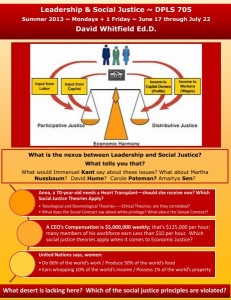Hi All,
I want to call out to you again, because of this very unique opportunity to be published.
The deadline is March 17. The journal editors are calling for papers to be submitted right now, and I believe you would likely have an excellence chance to land one of your articles in the journal.
Our very own Drs. Adrian Popa and Lazi Topuzova here at Gonzaga U. edit a journal called AUDEM aimed at leadership and democracy around the world.
It is a very strong journal, peer reviewed, and would serve very well on your curriculum vitae if you are planning on teaching at the university level.
If it comes down to you and a couple of other candidates for a teaching position somewhere and you have a publication like this and they do not, the publication really lifts your possibilities and may secure you the position.
So have at it! Any of your major papers may be a decent fit after you have taken a pass at the paper to build it toward this journal and what they are asking for.
Also feel free to contact Adrian or Lazi with any questions.
Thanks!
Shann
2013 AUDEM Call for Papers, Volume IV
Call for Papers
The mission of the Alliance of Universities for Democracy is to promote the development of democratic values, civil society, civic engagement, and intercultural understanding through international exchange among institutions of higher education.
The AUDEM Journal is a scholarly, peer‐reviewed journal that focuses on the initiatives and themes related to the organization’s mission. We invite contributions from international scholars from different disciplines working on issues of higher education and the development of democratic values. We encourage submissions of articles grounded in objectivist, interpretive, critical, or other epistemologies. We are committed to diversity of perspectives and encourage submission of articles representing (1) traditional quantitative or qualitative empirical articles, (2) integrative research reviews, (3) theoretical pieces contributing to new theory, and (4) well‐constructed, well‐argued conceptual papers that are thought provoking.
For its fourth volume, AUDEM: The International Journal of Higher Education and
Democracy is focusing on the following broad theme:
Changing Conceptions of the Modern University
We invite contributions on issues related to the challenges universities are facing today as well as on the conceptual and theoretical dimensions of civic engagement. Examples of pertinent questions include: What strategies are universities using for responding to changing national/ global/ international demands and effectively dealing with the proper mission of a university?; what are the defining issues of citizenship in the 21st century?; what are new frameworks for thinking about citizenship in this global era?; how is citizenship or the university mission being expressed in both virtual and face‐to‐face settings?; how do we approach democracy in a more global economic setting; what is the university’s role in civic engagement, service‐learning, and so on; what are challenges for scholars at risk serving in undeveloped democracies; and other viable topics on higher education. AUDEM: The International Journal of Higher Education and Democracy may also consider contributions that focus on other topics or initiatives closely related to higher education and democracy.
Instructions for Submission
Submissions should be received by March 17, 2013, to be considered for publication in Volume 4. Manuscripts and editorial communication should be submitted electronically to audemjournal@zagweb.gonzaga.edu
If you have questions you may wish to contact one of the editors, Adrian B. Popa (popa@gonzaga.edu) and Lazarina Topuzova (topuzova@gonzaga.edu) or the book editor Mariana Cernicova‐Buca (mcernicova@gmail.com).
In addition, please consider the following as you prepare your manuscript:
- Submissions should be original work by contributors not previously published or under review by a different journal.
- Manuscripts should be submitted electronically using Microsoft Word.
- Your manuscript should have a cover page with the title of the manuscript, the author(s), affiliation(s), and a complete email and mailing address for the corresponding author.
- Include an abstract of 150 words or less.
- Include 3‐5 key words.
- Limit your submission to 25 double‐spaced pages, with one inch margins. This page count excludes title and reference pages.
- References to published works must be cited in text and at the end of the manuscript.
- Contributors are accountable for the accuracy of statements they make in their articles.
- The Journal uses the American Psychological Association (APA) Style, 6th ed. and your manuscript should be formatted according to that style.
Examples
Hunt, J.G., Boal, K. B., & Dodge, G. E. (1999). The effect of visionary and crisis‐responsive charisma on followers: An experimental examination of two kinds of charismatic leadership. Leadership Quarterly, 10(3), 423‐448.
Manheim, K. (1952). Essays on the sociology of knowledge. New York: Oxford University Press.
For other referencing examples, consult The Publication Manual of the American Psychological Association (APA), 6th edition. All manuscripts must conform to ethical publication practices as specified in the ethical guidelines published by the American Psychological Association. Further guidelines will be sent to the author(s) upon acceptance of articles.
AUDEM: The International Journal of Higher Education and Democracy is a publication of SUNY Press: http://www.sunypress.edu/t-Journals.aspx

